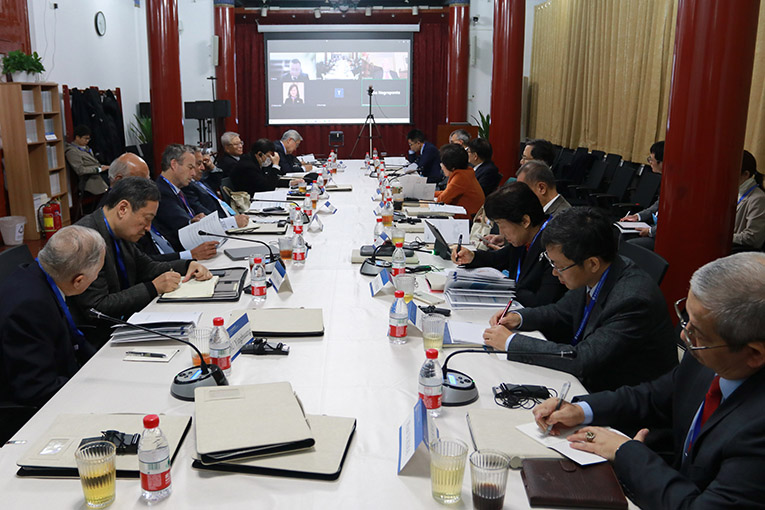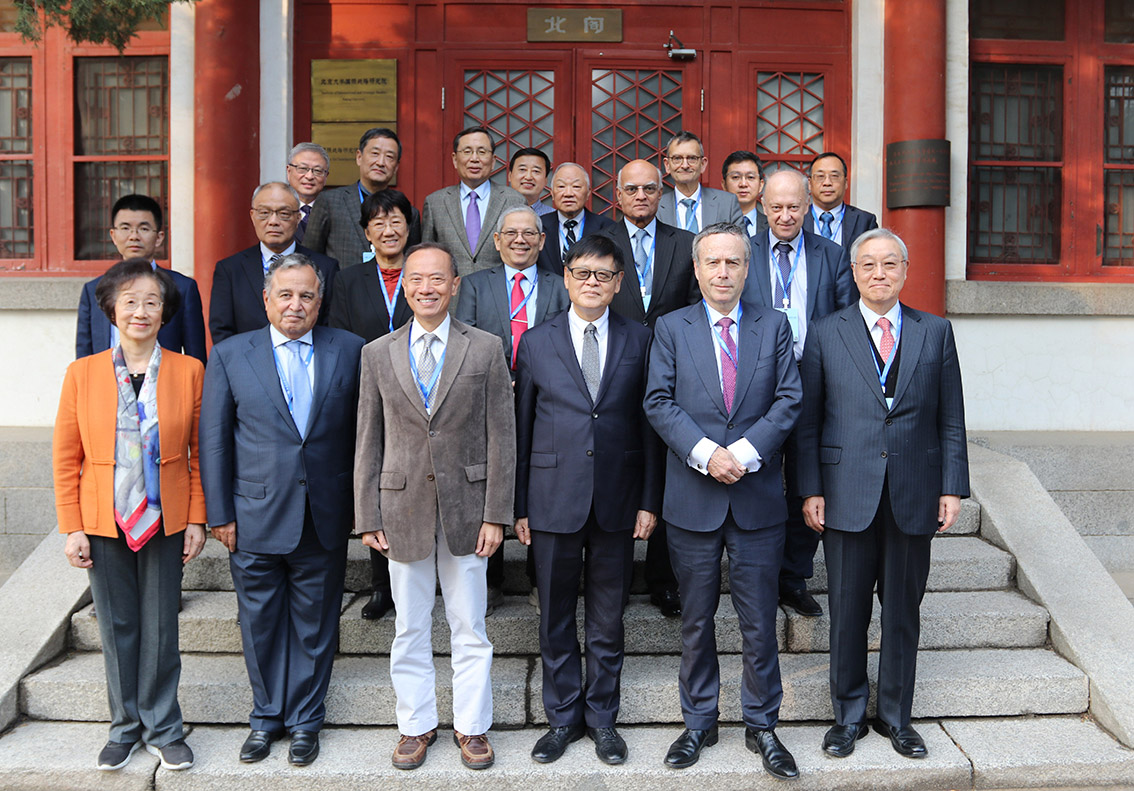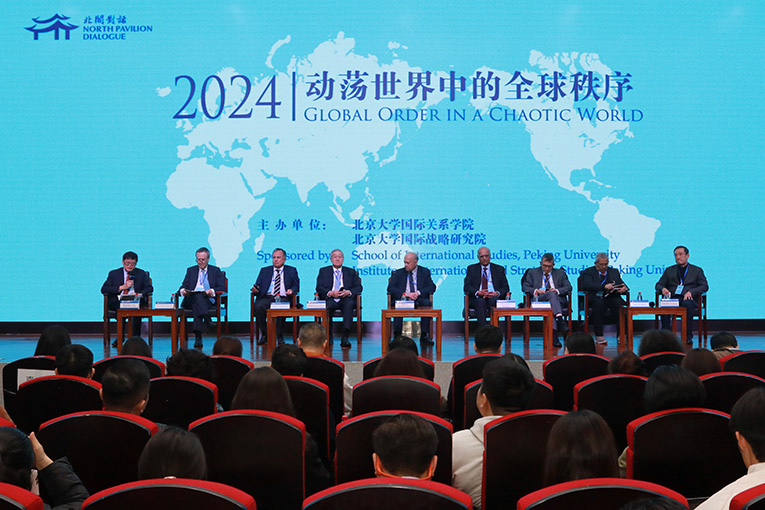From November 14 to 15, 2024, the 10th Annual Meeting of North Pavilion Dialogue was held at the North Pavilion of Peking University (PKU). Organized by the Institute of International and Strategic Studies (IISS), PKU, the event received strong support from the university and the School of International Studies (SIS), PKU. The “North Pavilion Dialogue” annually invites former political leaders, renowned experts, and scholars worldwide with extensive political experience, profound academic expertise, and broad strategic vision to discuss international dynamics and the future of global politics. Fang Fang, a Member of the Standing Committee of the CPC Committee and Vice President of PKU, attended the meeting to extend his congratulations.

This year, the North Pavilion Dialogue focused on the topic of global political trends and international reactions to the 2024 U.S. elections, highlighting the impact of recent changes in U.S. domestic politics on the global stage, security risks in Europe and the Middle East, and the evolving political and economic dynamics in the Asia-Pacific region. Participants observed that changes in the U.S. domestic political landscape are introducing new uncertainties into global and regional affairs. Conflicts in Europe and the Middle East are causing significant disruptions in global security. Meanwhile, the economic interdependence among Asian countries continues to deepen, with a shared commitment to maintaining regional stability. The attendees called for international collaboration based on mutual respect and shared interests to resolve ongoing regional conflicts through peaceful negotiations, preventing escalation and limiting the spread of conflicts. Participants emphasized that under the new global conditions, China and the United States should manage their differences on the principles of mutual respect, peaceful coexistence, and win-win cooperation. They advocated proactive efforts to promote economic cooperation and cultural exchange, address potential challenges in bilateral relations pragmatically, and strive for peaceful coexistence. Discussions also touched on the challenges posed by technological advancements, strategies to ease great power rivalries, and pathways to foster international cooperation.
The following 12 distinguished international guests were invited to the meeting: Lionel Barber, author, broadcaster and former editor of The Financial Times; Robert Blackwill, Henry A. Kissinger Senior Fellow, Council on Foreign Relations and former U.S. Ambassador to India; Nabil Fahmy, Dean Emeritus, School of Global Affairs and Public Policy, The American University in Cairo and Former Foreign Minister of Egypt; Rizal Sukma, Senior Fellow, Centre for Strategic and International Studies, Former Indonesian Ambassador to the United Kingdom, Ireland and the International Maritime Organization; Kim Sung-Hwan, President, Taejae Future Consensus Institute, former Minister of Foreign Affairs and Trade of the Republic of Korea; Andrey Kortunov, Academic Director General, Russian International Affairs Council; Shivshankar Menon, former National Security Advisor to the Prime Minister of India, former Foreign Secretary of India, former Indian Ambassador to China; John Negroponte, Vice Chair, McLarty Associates, former Deputy Secretary of State of the United States; Volker Perthes, Senior Advisor, German Institute for International and Security Affairs (SWP), former Under-Secretary-General, United Nations; Chikako Ueki, Professor, Graduate School of Asia-Pacific Studies (GSAPS), Waseda University; Dennis Wilder, Former Special Assistant to the President and Senior Director for East Asia, White House National Security Council, Senior Fellow, Initiative for U.S.-China Dialogue on Global Issues, Georgetown University; George Yeo, Former Minister of Foreign Affairs of Singapore.
Prominent domestic guests attending the conference included: Chen Xiaogong, former Deputy Director, Foreign Affairs Office of the CPC Central Committee, Lieutenant General (retired), Former Deputy Commander, PLA Air Force; Yao Yunzhu, Director Emeritus, Center on China-American Defense Relations, Major General (retired), Academy of Military Science, People’s Liberation Army of China; Yan Xuetong, Distinguished Professor, Honorary Dean, Institute for International Relations, Tsinghua University; Zhu Feng, Executive Dean, School of International Studies, Nanjing University, Executive Director, China Center of Collaborative Studies of South China Sea; Wang Dong, Deputy Director, Office for Humanities and Social Sciences at PKU, Executive Director, Institute for Global Cooperation and Understanding; Wang Yizhou, Boya Distinguished Professor at PKU, Vice President, China National Association for International Studies; Zhu Yinghuang, Special Advisor to China-U.S. Exchange Foundation (CUSEF), Editor-in-chief Emeritus, China Daily Newspaper Group. Participants from IISS, PKU included Yu Tiejun, President of IISS; Wang Jisi, Founding President of IISS; Yuan Ming, Senior Advisor to IISS; Guan Guihai, Executive Vice President of IISS; Gui Yongtao, Vice President of IISS and Senior Research Fellows Li Wei and Wu Bingbing.

On the afternoon of November 15, the School of International Studies (SIS), Peking University (PKU) and the Institute of International and Strategic Studies (IISS), PKU, co-hosted a public forum titled “Global Order in a Chaotic World”. At the forum, distinguished guests, including Lionel Barber, Nabil Fahmy, Kim Sung-Hwan, Andrey Kortunov, Shivshankar Menon, Volker Perthes, Rizal Sukma, and Wang Yizhou, engaged in candid and lively discussions. Topics centered on understanding the changes in U.S. domestic politics and their implications, as well as addressing new challenges the global order is facing. The forum featured deep interaction between the speakers and the audience. Prof. Wang Jisi chaired the event.

Formally established in October 2013, the Institute of International and Strategic Studies (IISS), Peking University (PKU) operates under the leadership of PKU. Leveraging the intellectual resources of the School of International Studies (SIS) and other related departments, the IISS undertakes research projects entrusted by government agencies and enterprises. IISS is dedicated to providing high-quality consulting services for China’s international strategy and foreign policy. It also maintains close collaborative relationships with prominent think tanks and academic institutions worldwide.
Since 2014, IISS, PKU has hosted the annual North Pavilion Dialogue. This initiative is part of PKU’s efforts to implement President Xi Jinping’s directive to build a new type of think tank with Chinese characteristics. IISS is committed to developing the North Pavilion Dialogue into a premier platform for fostering exchange and collaboration among domestic and international experts in international strategy. The dialogue aims to promote in-depth discussions and assessments of global affairs, enhance China’s role on the international stage, and promote cooperation, mutual benefit, and inclusive development in world politics.
The North Pavilion of the "North Pavilion Dialogue", formerly known as the Miner Hall, is located in the central part of the scenic Yan Yuan Garden and now accommodates the office of IISS.
Editor: Li Fangqi | Photographer: Zheng Peijie



 Features
Features










